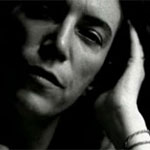patti smith reviews Shepherds
Bush Empire, London (August 11, 2003)
By David Landman 
IIt is August in London and the city is melting in a heat wave.
You are standing outside the Empire Theatre in West London, where Patti Smith
and her band will play later tonight, for the last time on this tour. There are
hundreds of people milling around - hip couples with tattoos; aging rockers mostly
in sensible shoes; sharp edged chicks - navel studs, black goth eyes; bizarre
roadies with thousands of hard miles behind them. And much more. And here are
Sandy and Jane - his shades, long ponytail and scrawny frame so cool, and Jane
with a new diamond nose stud. You file in slowly to the dark
coolness of the Empire, finding good seats in the balcony directly over stage
left. There must be a thousand people standing in the pit in front of the stage
as the theater fills. The enormous kit dominates the view. The ceiling is arched
and ornate. You talk a bit in the darkness and wait. You are
an innocent, a lamb, a child. They come out together, but
Patti is last, and she is beautiful. She is standing thirty feet from you. Black
jeans, pointed motorcycle boots - straps trailing, long black jacket, the kind
that drapes from the shoulders to the knees, a long starched white shirt to her
thighs, under a black leather vest. Beads, ribbons, rings. She is as thin as a
knife. Her face is sharp in profile, like a razor. And, of course, the hair. And
then it starts. She is chanting, shouting, singing, hip swinging, teasing, fist
pumping mad, angelic, extraordinary. Her voice, her personality wash over two
thousand people as the music builds. And we are all powerless. We are hers, and
she knows it. Oliver Ray is destroying his Stratocaster in huge, sweeping arcs
of his right hand. There is a giant screen behind Jay Dee Daugherty with strange
tilted B&W cemetery images flashing. The crowd jumps and vibrates and the
pulse of the music seizes you. And you realize this is way beyond music. Way beyond
performance art. This is uncharted territory. This is 1959. This is the 25th Floor.
This is Redondo Beach. This is Break it up, Beneath the Southern Cross, Summer
Cannibals, Free Money. But it isn't relentless. There is a
rhythm, a graceful cadence. She reads - Herman Hesse, Ackroyd on Blake, her own
works and a moon thing. She wears round wire granny glasses when she reads and
keeps losing them in her pockets while she sings. And she chats - the crowd calls
to her and she chats. The graves she and Oliver have visited, her vision of a
perfect Brönte cottage, some stuff about the Band and the Tour. Her smile
is wonderful. But always back to the timeless, powerful music.
It just goes on. Jay Dee's drumming is powerful, non-stop; a very big sound. During
Summer Cannibals there is a grainy tape of her rehearsing the song in a studio
somewhere. She spins and faces herself while she mouths the same words on stage
and on the huge screen. There is Frederick, and Dancing Barefoot. Right after
that, you start to think, where is Power to the People, where is Paths That Cross,
and then you hear the first piano notes, the unmistakable chords you have heard
over and over, and you realise it is Because the Night, and you are a fool because
you forgot it would come. This really happens. By now she
has stripped everything off but the jeans and her black tee shirt. When she sat
in a chair on center stage, pulling off her boots and socks, you cried at the
sight of her bare feet. And as the set starts to end, after almost three hours,
she gathers herself up. She kneels on one knee, head bowed, as Rodin would have
posed her, collecting herself. And Oliver Ray crouches, stage right, in front
of the amps, his Fender under one arm like a machine gun, pulling on endless cigarettes,
black goatee, watching her in a way you have seen before. It is the way a wrangler
crouches and studies a horse from a distance, squinting. There
is much more. The intense heat rising. The shimmering light onstage bleeding out
into the darkness. Power to the People, followed by a long, passionate, perfect
recitation of the Declaration of Independence ending in a tirade against Bush
the war criminal. And some sharp words for the Band and the lighting - "I'm
not a spotlight kind of girl," she says. And before it
is over, she steps off the stage into the crowd before her and disappears through
a door. Everyone stares. You look down from the railing and suddenly everyone
is looking up at you and Sandy and Jane, because ...... she is standing beside
you. She is laughing and waving (and riding some kind of euphoric wave), and you
take her hand and you just squeeze. This really happens too. And
then she is gone, moving through the crowd, and all this time Oliver and Lenny
Kaye are riffing on Rock and Roll Nigger and the music is pounding and then she
is back on center and she finishes. And then it is over. Completely. "Well,
we played a little too long," she says in the sweetest voice. "Go home.
Drink lots of water. H2O." |